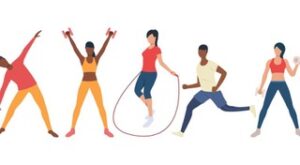A Fitness Program for 2023
Good for the Young as Well as the Older

Since my stroke three months ago, I’ve been trying to get back into my former physical shape. I want to reclaim my strength, speed, flexibility, and stamina – the things that make it possible to play Brazilian Jiu Jitsu. Enjoying my favorite sport is a good reason to get fit again. But a better reason, thanks to surviving the stroke, is the recognition that achieving certain levels of physical performance health should not only extend but also enhance the quality of my life.
I’ve been reading about and reporting on fitness and longevity regularly since early 2000. In that time, there has been an unending stream of studies on those topics with a variety of findings. (As you might expect.) But of everything I’ve read, including many meta-studies, there are two objectives that matter more than any of the others.
They are not, as one might expect, those things that one notices most about aging: the diminishing flexibility, stamina, and balance. Those are important. But the studies show that the thing that matters most is strength: muscular strength, skeletal strength, and the strength of the heart and lungs.
If you are younger than 50, my approach to exercise may be similar to the one you are doing now. I exercise all the muscle groups and my lungs pretty hard. People 50 and over are typically advised to (or feel comfortable with) exercise that is less intense. When it comes to training my heart, my approach would have been considered radical for anyone over 40 and downright dangerous for anyone in his 70s. And many doctors and fitness experts that are not familiar with all the recent studies (like the one below) would have that view today. So, find someone that you trust, who is also up to date on fitness studies, to advise you personally.
My exercise routine is based on the notion that to make your body stronger – and that includes not only your muscles but your skeleton, your heart, and your lungs – you have to stress it by pushing yourself harder than you probably want to. It means lifting more weight, sprinting faster, and generally pushing yourself towards exhaustion.
This is what I do:
Although I schedule six hour and a half workouts a week, I do fewer than that at least one week a month. Four of those sessions are doing Brazilian Jiu Jitsu. The way I train (hard for an hour of the 90 minutes), it exercises my entire body, inside and out, and leaves me exhausted. Two days a week I do a physical fitness training. This consists of about 40 to 50 minutes of heavy and intense weightlifting, 20 minutes of intense cardiovascular exercise (usually four 5-minute bike sprints), and 20 to 30 minutes of stretching.
My goal in weightlifting is to exhaust my muscles. That means lifting like a power lifter or an Olympic lifter (hard and fast), rather than a body builder (less weight and more control). And I try to get stronger, either in terms of maximum strength or stamina.
My goal in cardiovascular exercise is to do at least three bike sprints (on an Aerodyne bike) in 30 minutes. Given the condition of my knees these days, it’s tough. (Believe me!) I don’t do a single five-minute ride at a moderate pace. I sprint as hard as I can for 15 seconds, continue at a moderate rate for 10 seconds, and repeat. I monitor my heart while I bike. My goal is to get my heart to its maximum level, which in my condition these days is about 170 beats.
If I have a good workout:
* I will have achieved a heart rate of 170 beats at least once.
* I will feel physically exhausted – like I could not climb a flight of stairs.
* I will have sweated off at least 2% of my body weight – i.e., more than four pounds.
* I will feel very good.
Unless I have business or family requirements that make it impossible, I am pretty good about finding time to exercise six times a week. But I can’t say that I achieve the goal of exercising to exhaustion every time.
In fact, it’s not unusual – and lately, it’s quite common – for me to walk into my gym with a head full of reasons why my trainer should take it easy on me. I don’t beat myself up about this impulse to shirk the work. I accept it as a natural and inevitable product of getting older. But what has been working for me is that I’ve told my trainers to agree with whatever BS I tell them and get me moving slowly at first… and then gradually push me as hard as I’ll go for the rest of the time.
If you don’t have a trainer, that will be more difficult. But you can still do it. Just start off easy and increase the pace and intensity gradually. As your body warms up, you will find that you can do more than you might believe.










